Robotic Process Automation (RPA) first emerged in the early 2000s, with UiPath, Blue Prism, and Automation Anywhere releasing their products and libraries around 2003. RPA started as a way to reduce outsourcing costs, with business leaders finding new revenues to automate in each industry, such as finance, healthcare, and HR.
We analyzed RPA market trends utilizing the latest market research:
RPA market share by leading vendors
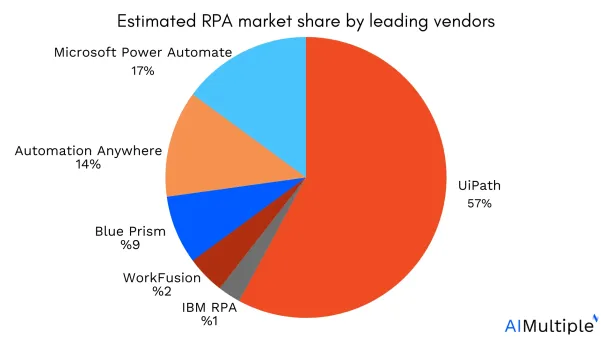
The market share distribution of Robotic Process Automation (RPA) vendors can be approximated by analyzing the relative search volumes, which serve as a proxy for brand popularity and public interest. The search volume data presented here reflects the average number of monthly searches for each RPA vendor and can be considered an indirect indicator of their market share and general visibility in the industry.
The following search volumes were used to calculate the approximate market share percentages of each RPA vendor:
| Vendor | Search/Month* | User Ratings** |
|---|---|---|
| UiPath | 165,000 | 4.6 based on 6,694 reviews |
| Microsoft Power Automate | 49,500 | 4.5 based on 551 reviews |
| Automation Anywhere | 40,500 | 4.5 based on 5,494 reviews |
| Blue Prism | 27,100 | 4.5 based on 399 reviews |
| WorkFusion | 3,600 | 4.4 based on 29 reviews |
| IBM RPA | 1,600 | 4.7 based on 284 reviews |
*We obtained the search/month data from Keywords Everywhere.
**User ratings are based on G2.
Based on these figures, the estimated market share for each RPA solution was derived by calculating the percentage of the total search volume attributed to each brand. This approximation indicates the relative popularity and market presence of these tools within the automation industry.
UiPath holds the dominant share, followed by Microsoft Power Automate and Automation Anywhere, while IBM RPA and WorkFusion exhibit significantly lower search volumes, suggesting limited market traction.
This approach, although based on search data rather than direct sales or usage metrics, provides data into the competitive landscape of RPA tools, reflecting the growing awareness and consumer interest in these automation solutions.
Other analysts’ view of the market
Older industry analysts also rank RPA vendors. They are opaque in how they rank companies and use jargon that can not be measured objectively like “Strength of strategy” to rank companies. But given their historical reach, vendors still value their reports so we also took a look at their rankings:
Gartner MQ RPA
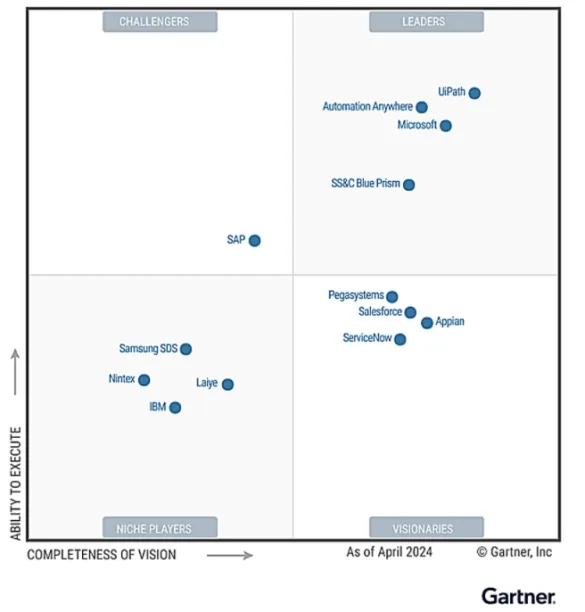
Forrester Wave RPA
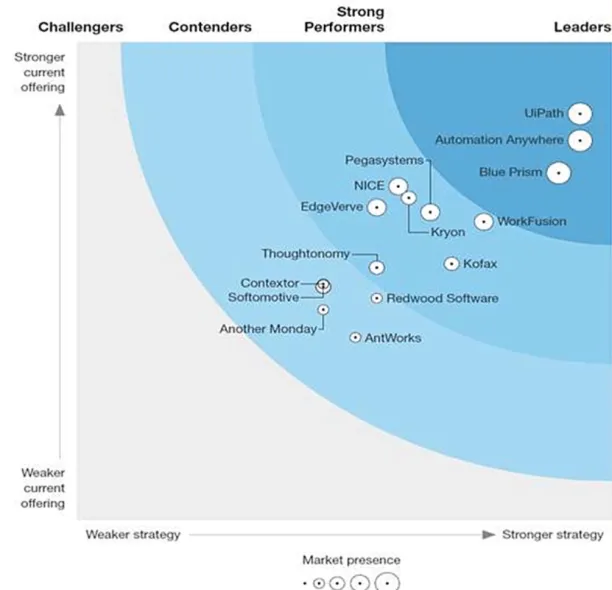
Everest Peak RPA
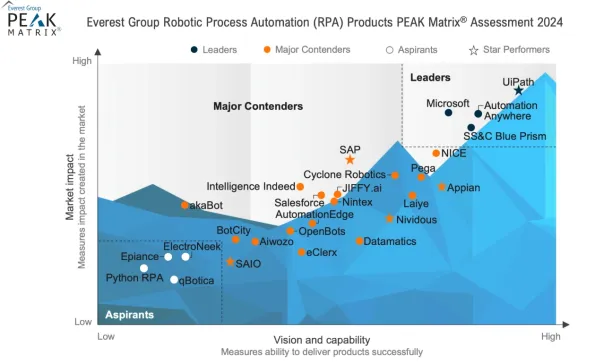
List of RPA vendors
Here, leading RPA companies are sorted by their year of founding
1. Blue Prism
Blue Prism (Acquired by SS&C in 2022 Q1) is the oldest RPA vendor, founded in 2001. They claim to have coined the term “Robotic Process Automation” and they provide an intelligent automation platform that digitizes the workforce.
- Product: Intelligent RPA Platform
- Example features:
- Visual process designer, allowing the user to monitor data flow and which tasks come next
- Load balancing, encryption, and audit
- Free trial: None
- Prerequisites: Moderate-level programming skills
- Companies using Blue Prism: Many enterprises
Check our data-driven article on Blue Prism alternatives to explore the strengths and weaknesses of the tool.
2. Automation Anywhere
Automation Anywhere was founded in 2003 and currently provides a cognitive RPA platform to automate end-to-end business operations for companies. The most significant feature of Automation Anywhere software is the macro recorder, which records the user performing the tasks and then makes logic out of it without the need for programming sequential actions.
- Products: Automation Anywhere Enterprise, IQ bot
- Software key features:
- IQ Bot: Built-in AI technologies (OCR, NLP, predictive analytics)
- Macro recorder, task scheduler, and single-click web data extraction
- Browser-Based: Accessible from anywhere, no specialized software needed.
- Free trial: 45 days for enterprises
- Prerequisites: Beginner-level programming skills
- Companies using Automation Anywhere: Includes Deloitte, Dell, PwC, AT&T and Boston Scientific
3. UiPath
UiPath was founded in 2005 and was ranked #2 in the Financial Times FT1000 ranking of Americas’ fastest-growing companies in 2020. UiPath offers a scalable platform that can be integrated with existing company infrastructure. A key feature in UiPath software is the drag and drop, which allows the user to create visual processes by dragging and dropping relevant activities onto the graphical workspace.
- Products: UiPath Enterprise RPA Platform
- Software key features:
- Macro recorder, workflow drag and drop, pre-built templates
- Built-in AI technologies (OCR, NLP)
- Autopilot Option: Users can build automation bots simply by writing.
- Free trial: 30 days for enterprises
- Prerequisites: Visual basics, no programming skills required
- Companies using UiPath: 8 out of Fortune 10. Includes Deloitte, Wells Fargo, DHL, Siemens, and Schneider Electric.
4. WorkFusion
WorkFusion was founded in 2010 and was ranked #1 in innovation capability by HFS. WorkFusion provides enterprises with the only automation platform powered by artificial intelligence (AI). WorkFusion offers hyper-automation solutions with pre-trained bots on processes such as anti-money laundering, account opening, and KYC.
- Products: WorkFusion Intelligent Automation Cloud
- Software key features:
- Macro recorder, pre-trained bots,
- Document intelligence: digitize, classify, make decisions, and extract data from unstructured data
- Workflow designer (combining machine learning, manual and bot tasks, and other elements into complex automation workflows)
- Task designer (creates manual tasks for including the human-in-the-loop (HITL))
- Free trial: None
- Prerequisites: Beginner-level programming skills
- Companies using WorkFusion: Includes Deutsche Bank, Scotia Bank, and McKinsey & Co.
5. Microsoft Power Automate
Founded in 2005 under the name Softomotive, the company started operating under the name Microsoft Power Automate after its acquisition by Microsoft in 2020. Microsoft Power Automate provides an end-to-end intelligent RPA platform for enterprises.
- Products: Power Automate
- Software Key Features:
- Macro recorder, pre-built processes, and workflow drag-and-drop
- Visual Editor
- Attended and unattended automation
- Bot Performance Analytics
- Prompt-based flow creation and Q&A for real-time guidance/troubleshooting.
- Free trial: 30 days for enterprise
- Prerequisites: Beginner-level programming skills
- Companies using Microsoft Power Automate: Includes J.P Morgan, Adobe, and Intel.
6. IBM RPA
IBM RPA, a product of IBM, enables organizations to automate complex processes through its deep integration with the IBM ecosystem.
- Product: IBM Robotic Process Automation
- Software key features:
- IBM ecosystem integrations (e.g. IBM Watson)
- Comprehensive documentation
- Low-code authoring tools
- No-Code & script switching
- Free Trial: Available.
- Prerequisites: Beginner-level programming skills.
- Companies Using IBM RPA: Includes Adobe, Siemens, Cobmax.
Which vendor is the most popular and why?
The market is quite concentrated. >85% of search engine users are searching for the names of just the top 3 players: UiPath, Automation Anywhere, and Microsoft Power Automate.
UiPath attracts the most attention in searches in the robotic process automation (RPA) market. UiPath’s leadership in market share, high customer reviews, wide enterprise adoption rate, and user-friendly features make it the most popular choice among the other RPA providers listed.
For more on RPA
You can find everything you need to know about RPA software vendors, market presence, and insights on our webpage RPA Software
To learn more about:
- RPA use cases and applications, read our article about Top 100 RPA Use Cases with Real-Life Examples
- How to get training on RPA, read our article Top RPA Training Courses to Become an RPA Developer
FAQ
Who are the key players in the competitive landscape of the RPA market?
The robotic process automation market is dominated by several key players, including UiPath, Automation Anywhere, Blue Prism Group PLC, Microsoft (RPA Power Platform products), IBM RPA, and WorkFusion. These companies offer robust automation solutions and hold significant market revenue, shaping the overall competitive landscape through continuous technological advancements, strategic acquisitions, and expansions in regions like Asia Pacific, Middle East, and South Korea.
What is driving the market growth of Robotic Process Automation (RPA)?
The RPA market is fueled by the need to automate tasks and reduce costs in various industries. The integration of intelligence into RPA solutions is further fueling market growth, especially with the trend of increasing digital transformation worldwide.
How can RPA technology benefit business operations?
Robotic process automation technology helps organizations automate business processes, especially routine and rule-based tasks such as data entry and document processing, significantly improving business workflows. This directly contributes to reduced operational expenses and accelerates an organization’s digital transformation journey.
What is the forecast period and expected market size for the global RPA market?
The global RPA market is projected to experience significant growth over the forecast period, with analysts predicting a substantial increase in overall market value and market size. Growth factors include ongoing digital transformation efforts, expanding use of RPA across different sectors (market segmentation), and growing recognition of RPA as a critical management solution. The market is expected to sustain a high compound annual growth rate (CAGR), driven primarily by widespread adoption of advanced technologies in business environments aiming to optimize efficiency and productivity.
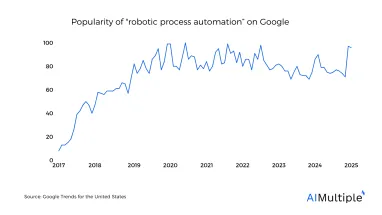
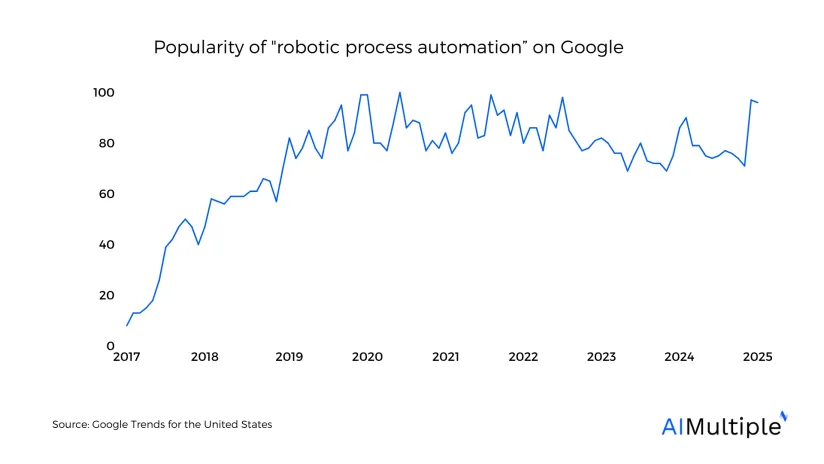

Comments
Your email address will not be published. All fields are required.